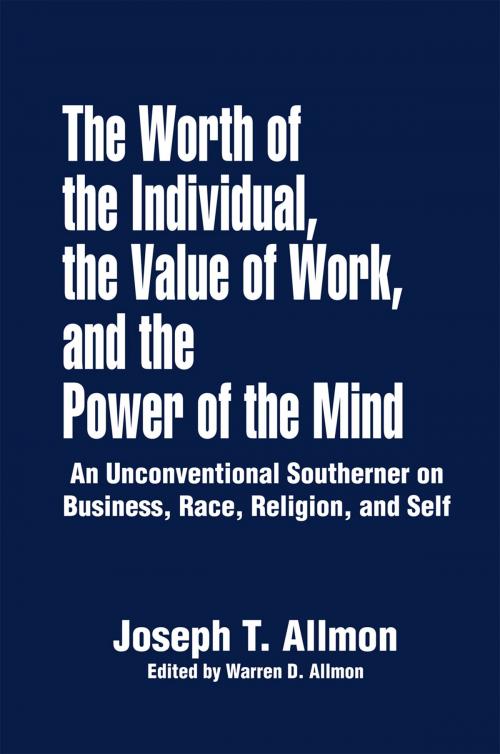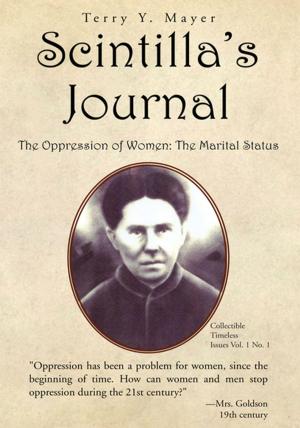The Worth of the Individual, the Value of Work, and the Power of the Mind
An Unconventional Southerner on Business, Race, Religion, and Self
Nonfiction, Religion & Spirituality, Inspiration & Meditation, Sermons| Author: | Joseph T. Allmon | ISBN: | 9781453568637 |
| Publisher: | Xlibris US | Publication: | October 11, 2010 |
| Imprint: | Xlibris US | Language: | English |
| Author: | Joseph T. Allmon |
| ISBN: | 9781453568637 |
| Publisher: | Xlibris US |
| Publication: | October 11, 2010 |
| Imprint: | Xlibris US |
| Language: | English |
This volume contains the unpublished writings of the late Joe Allmon, edited by his son, Warren. Joe Allmon grew up poor in Depression-era Mississippi, and became a Baptist minister like his father. But he suffered a crisis of faith as a young man, and switched careers to become a human resources executive, applying many of the counseling skills he had developed in the ministry. His life in corporate America, however, was unusual. As the writings collected here eloquently demonstrate, he was always in the process of becoming something else and expanding whatever mold he was in. Joe Allmon was a Baptist minister who became a Unitarian. He was a white southerner who became dedicated to equality of opportunity regardless of race. He was a corporate executive who unpretentiously quoted Shakespeare and the Bible, wrote poetry, and could read Greek and Hebrew. He was a Mississippian who had deep admiration for northeastern culture and Ivy-league education. He was a Republican devotee of laissez-faire who wound up proudly voting for liberal Democrats. His life was in a way dedicated constantly to struggle, to be smarter, more educated, more cultured, never poor again, and to leave the world a slightly better place. Although he spent almost 20 very influential years living in New York, Joe was rooted in the South. His strongest memories were always of Mississippi. He was shaped by the regions complex history and sometimes contradictory qualities: poverty, beauty, cruelty, grace, religion, gentility, ignorance, tradition, conservatism, and the struggle for a better life. His life spanned and contributed to a remarkable social and cultural transformation of this region. The writings in this volume are divided into three sections. First is a selection of the scores of sermons he delivered, from his time as a divinity student at Theological Seminary to his service as a Naval chaplain. The second includes speeches Joe gave from the 1950s to the 1980s. Most of these were given as part of his job as a human resources executive, but this included not just personnel matters (such as compensation, recruiting, and training), but also serving as a general spokesperson for the company to various public audiences. Toward the end of his career, Joe was not only invited to talk as a representative of the corporation, but also as a respected commentator on business-related topics in his own right. A number of the speeches are also connected to his not-for-profit involvements, including his association for 50+ years with Unitarian-Universalism. At the end of the volume is a short section that includes a short fragment of a novel, and the small number of poems and pieces of prose. In their emphasis on individual merit and effort combined with equal opportunity and an intellectual approach to human resources, the business speeches are valuable for their own sake. What holds them together with the rest is that they all focus on a limited set of themes -- the worth of the individual (regardless of race or background), the value of work, and the power of the mind. Joe Allmon strongly believed in these three things, and he applied them to almost everything he did from his paying job to his volunteer work to his family life. The worth of the individual. For Joe, every person was inherently important and worthy of respect and being listened to, no matter what their background or point of view. He loved to talk to people, and he loved to listen. He loved to hear peoples stories, where they were coming from, why they thought what they did. He loved conversation, and the learning that he said always resulted. He thought that everyone had something interesting to say, and that you could always learn something from talking to someone, no matter who they were. The value of work. Like many of his generation, which grew up in the Great Depression, Joe knew the importance of hard work. Although his family was not among the poorest of the poor, th
This volume contains the unpublished writings of the late Joe Allmon, edited by his son, Warren. Joe Allmon grew up poor in Depression-era Mississippi, and became a Baptist minister like his father. But he suffered a crisis of faith as a young man, and switched careers to become a human resources executive, applying many of the counseling skills he had developed in the ministry. His life in corporate America, however, was unusual. As the writings collected here eloquently demonstrate, he was always in the process of becoming something else and expanding whatever mold he was in. Joe Allmon was a Baptist minister who became a Unitarian. He was a white southerner who became dedicated to equality of opportunity regardless of race. He was a corporate executive who unpretentiously quoted Shakespeare and the Bible, wrote poetry, and could read Greek and Hebrew. He was a Mississippian who had deep admiration for northeastern culture and Ivy-league education. He was a Republican devotee of laissez-faire who wound up proudly voting for liberal Democrats. His life was in a way dedicated constantly to struggle, to be smarter, more educated, more cultured, never poor again, and to leave the world a slightly better place. Although he spent almost 20 very influential years living in New York, Joe was rooted in the South. His strongest memories were always of Mississippi. He was shaped by the regions complex history and sometimes contradictory qualities: poverty, beauty, cruelty, grace, religion, gentility, ignorance, tradition, conservatism, and the struggle for a better life. His life spanned and contributed to a remarkable social and cultural transformation of this region. The writings in this volume are divided into three sections. First is a selection of the scores of sermons he delivered, from his time as a divinity student at Theological Seminary to his service as a Naval chaplain. The second includes speeches Joe gave from the 1950s to the 1980s. Most of these were given as part of his job as a human resources executive, but this included not just personnel matters (such as compensation, recruiting, and training), but also serving as a general spokesperson for the company to various public audiences. Toward the end of his career, Joe was not only invited to talk as a representative of the corporation, but also as a respected commentator on business-related topics in his own right. A number of the speeches are also connected to his not-for-profit involvements, including his association for 50+ years with Unitarian-Universalism. At the end of the volume is a short section that includes a short fragment of a novel, and the small number of poems and pieces of prose. In their emphasis on individual merit and effort combined with equal opportunity and an intellectual approach to human resources, the business speeches are valuable for their own sake. What holds them together with the rest is that they all focus on a limited set of themes -- the worth of the individual (regardless of race or background), the value of work, and the power of the mind. Joe Allmon strongly believed in these three things, and he applied them to almost everything he did from his paying job to his volunteer work to his family life. The worth of the individual. For Joe, every person was inherently important and worthy of respect and being listened to, no matter what their background or point of view. He loved to talk to people, and he loved to listen. He loved to hear peoples stories, where they were coming from, why they thought what they did. He loved conversation, and the learning that he said always resulted. He thought that everyone had something interesting to say, and that you could always learn something from talking to someone, no matter who they were. The value of work. Like many of his generation, which grew up in the Great Depression, Joe knew the importance of hard work. Although his family was not among the poorest of the poor, th















